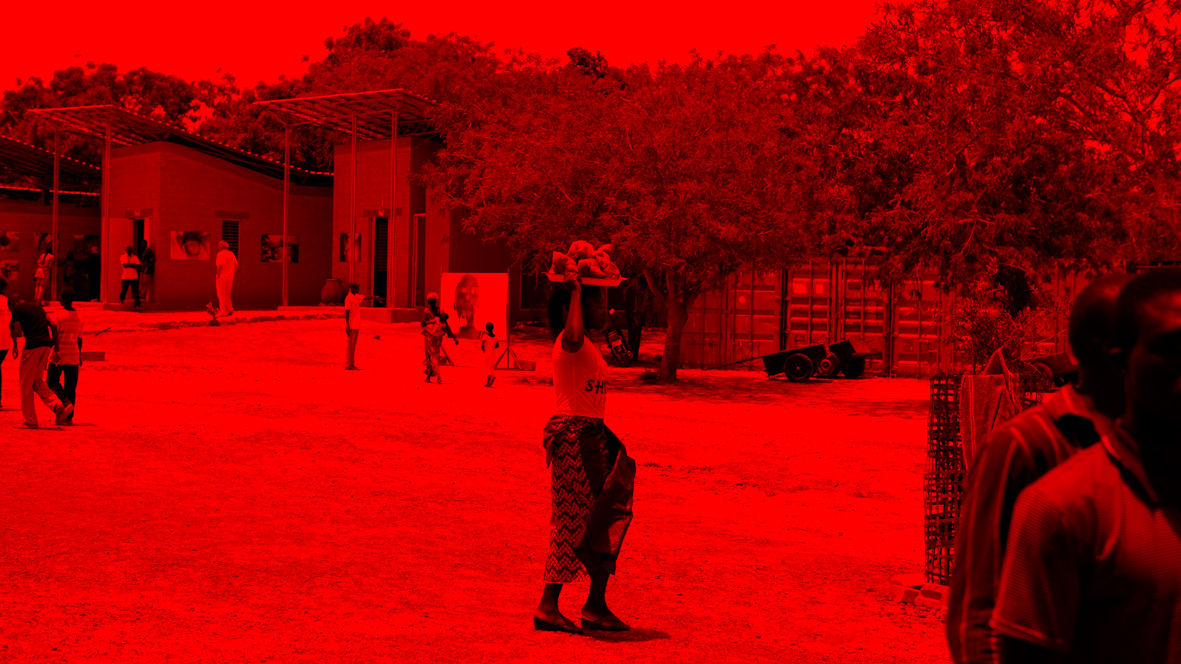
Artist-in-Residence 2020
Artist-in-Residence
2020
Diana Ejaita • Rahima Gambo • Taiwo Ojudun Jacob • Anja Saleh

Akinbode Akinbiyi
Akinbode Akinbiyi (* 1946 in Oxford, UK – lives in Berlin) is a chronicler of daily life who is more interested in “everydaylifeness” rather than the everyday. He has been working as a photographer and author since the early 1970s. His artistic focus is on the large urban agglomerations and megacities, especially on the African continent. He moves like a flaneur on main and side streets through the everyday life of these cities, their shopping centers and amusement facilities, in order to make recordings that bring the vibrancy of these conflict-laden rooms to life. Akinbiyi turns his attention to the rituals of everyday politics, spirituality and humanity beyond the shiny surfaces of constructed identities. He seeks, consciously or unconsciously, for breaks in our everyday life. His work is exhibited and published worldwide. In 2016 he was awarded the Goethe Medal. Most recently, his work was on view in a monographic exhibition at the Gropius Bau Berlin (February 7th – July 19th, 2020).
Operndorf – Abuja – Berlin – Lagos
Residence means being at home. The feeling, even the mindset, to feel being one with the place, the surroundings, the nature. The artist residency includes time to ponder, to think about new ways, to try out long-sitting ideas. The Opera Village is both the seat of a generous artistic gesture and the place for artists to develop themselves further.
Four very different artists were selected for this year, all of whom are closely related to the problem of the original gesture: because the original idea for the Opera Village did not come from a Burkinabé or someone with West African roots, but from someone from the northern hemisphere . This immediately gives rise to complexes of history, such as colonialism, post-colonialism, paternalism and much more. The four participants of this year’s artist-in-residence program will deal intensively with their individual paths in a wide variety of ways and try to involve the locality, the local residents, to develop new sounds: of being at home and of getting there.
My curatorial impulse for the selection of the four artists was and still is a deep-seated openness. How they should experience the weeks and months on site was not discussed in advance. Their creativity, their own paths will show themselves, will develop every day, the air and heat of the Sahel will gradually become their own. Basically, however, there is also an examination of the original gesture of the founding of the Opera Village. To what extent is this founding idea still feasible in a world that is confronted with even more extreme conflicts and problems. Is opera still a contemporary creative form of perceiving deep-seated desires and dreams?

Diana Ejaita
Diana Ejaita works as an illustrator and textile designer in Berlin. Born in Cremona, Italy, of Nigerian and Italian roots, the multidisciplinary artist’s style pays homage to her West African and European lineage, weaving symbolism through narrative pattern and texture. In 2014, Ejaita created a fashion label “WearYourMask” to create a dialogue between tradition and modernism. More recently, Ejaita’s work received wider acclaim, as she illustrated a New Yorker cover titled “Iya Ni Wura (Mother Is Gold)”, an ode to Nigerian and universal motherhood followed by two more covers “Portrait of History” for MLK day and “A Family Blooms”. Ejaita now works as an established illustrator for several magazines such as The New York Times.
I am very much looking forward to working and learning during the residency at the Opera Village in Burkina Faso. I am particularly curious to learn about renewed Burkinabe textile traditions and would love to create a collaboration with local cotton weavers and artisans. I am very excited about this chance to travel and discover a new country and culture, I feel that in these times the connections, communication and exchange between Africa and the African diaspora is getting more intricate, the bond is growing stronger. I am very thankful for this opportunity.

Rahima Gambo
Rahima Gambo (*Abuja, Nigeria) is an artist and photographer who came to artistic practice by working independently on long-form transmedia documentary projects. Currently, she explores a rehabilitative moving photography through the experimental capabilities of “walking” as it intersects with documentary storytelling psycho-spiritual-geography, socio-politics, public space and autobiography. She incorporates collaborative practices, sculpture, installation and performance in her work.
She was recently named a FOAM Talent for 2020 and was amongst the awardees of the Contemporary African Photography Prize 2020 and part of the World Press Photo Joop Swart Masterclass, Goethe-Institut Photographer’s masterclass in Johannesburg in 2017. She has completed fellowships with the Magnum Foundation, Open Society Foundation Documentary Photography, and the International Women’s Media Fund.
I am honored to be invited and look forward to being present, embodied and inspired as an artist in residence at the village. I will be continuing my work around “Walking” during the residency and the new propositions and departures that will come about by my interactions and entanglements in this location.

Taiwo Ojudun Jacob
Taiwo Ojudun Jacob (lives in Lagos, Nigeria) is a Nigerian multidisciplinary artist and curator. In his dance and live performances, which also include physical theater, music and film, he directly involves the audience and tries to break through common discourses in the local and international cultural scene. Together with two artists, he founded the art collective “Illuminatetheatre Productions” in 2015, for which he is currently the artistic director. Illuminatetheatre is a non-profit multidisciplinary creative laboratory where young people work together to develop various experimental artistic projects that involve the audience and different communities. Odujun’s work is deeply inspired by his roots. Since 2018 he has been investigating colonial archives and unsustainable privileges in his work. These works reflect the social and political prejudices in post-colonial African communities. In 2018 Odujun was resident artist of an exchange program between Lagos and Berlin, which is organized by the Goethe-Institut Nigeria and the ZK / U Berlin, as well as a Fellow of the Global Youth Culture Fellowship in Jeju, South Korea. Odujun is the curator of “Art Mobile, Lagos”, an art festival that opens in Lagos next year.
I am interested in women, especially how they are perceived and represented. Because for gender equality, it is essential to deal with the various forms of these representations. On the African continent there are diverse cultural interpretations of “gender equality”. My research will focus on the traditional African representation of women. It will aim to sift through oral archives and documentation. I would like to question cultural hegemony in order to understand the status of male dominance in contemporary African communities.

Anja Saleh
Anja Saleh (* Germany, lives in Berlin) is a designer, poet and educator. With a background in political science and sociology, she strives to question acquired and obtainable knowledge in her current writing and drafts, emphasizing the communicative value of the objects instead of their mere aesthetics. She is the founder of TAVII Studio and processes many of her questions and stories in her jewelry and fashion designs for TAVII as a less direct approach to her poetry and prose. Given that all things, actions and decisions are political, she works on collections that are inspired by less considered communities (in the dominant narrative) in Egypt and that question the status quo of what is perceived as good or beautiful design.
I’m looking forward to my stay at the Opera Village in Burkina Faso. Not only because, I get the opportunity to exchange ideas and learn about contemporary art, a new culture and above all the people around me, the locals, local craftsmen and fellow artists. But also because the experience promises to raise even more questions, and because it involves more reflection on my personal but also the collective positionality of people like me – those from the so-called African diaspora – and the subconsciously existing entitlement to their existence, ideas and stories to be understood globally. Not only will it be an enriching experience, it will also – I hope – take away many of the ideas and definitions of myself and at the same time allow me to learn from (artisanal) craftsmen and the unique environment.

Die Künstlerresidenz Jahrgang 2020 entstand mit freundlicher Unterstützung durch:







